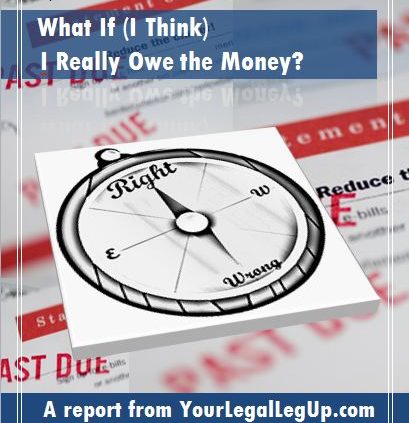What if I Really Owe the Money – or Think I Do?
What if you think you really owe the money? Should you defend yourself? Here’s why you must defend yourself. If you don’t you run the risk of having to pay twice. And if you do defend yourself, you probably won’t have to pay. If that bothers you, give the money to somebody who really needs it.
Most People Being Sued Actually DO Owe Someone Some Money
If you’re being sued by a debt collector, you probably think you owe them the money, although it’s surprising how often people who do NOT owe anybody any money get sued. If that’s you – you still need to fight the case, it won’t go away by itself. But if you actually do owe somebody the money for which you are being sued, you still need to be careful.
And you should still defend yourself as well as you can.
You must make the debt collector prove every part of its case – not only that you owe the money, but that you owe it to them. And exactly how much you supposedly owe. That’s because old debts get sold – often more than once – and if you don’t make the debt collector prove it owns the debt, you may pay the wrong person. And then you might have to pay again if you get sued by the person that actually owns the debt.
In addition, most people who get sued for debts do not owe what the debt collectors are trying to collect. They routinely add fees and interest they should not, and consumer protections agencies and organizations routinely estimate that almost all debt collection suits include extra charges – and many of them are for far more than is owed.
“Double-Banging”
Because of the extremely lax regulation of debt collectors, and the frequent erosion of those regulations that do exist, debt collectors develop many dirty tricks. One of the dirtiest is known as “double-banging.” This is the repeated collection of the same debt by the same debt collector. You may wonder how such a thing is possible, and it would be difficult, no doubt, if these double-bangers didn’t have a couple of things going for them.
One thing that makes double-banging easier is “spoofing.” That’s a technology that allows debt collectors to cause your phone to think the phone call is coming from another number, usually a local exchange. Thus, while your phone tells you the call is from your own telephone area code, it’s actually originating far away. And of course the debt collectors often change their names – not just the people calling, but the companies they’re supposedly representing. So you are receiving a call from a company that already collected from you, and now it is collecting the same debt again under another name. And they don’t necessarily wait till you have paid the debt off the first time, either. In one known case, a debt collector collected the same debt TEN times.
And that was without even suing the victim. They can do that, too.
Ultimately, what makes all this possible is that people let it happen. That is, they get scared, or feel guilty, or get angry… any number of feelings cause you to relax your guard, and then they get you. Instead of requiring them to provide proof, you’re asking how to pay.
And once they get you, you go on a “sucker list.” That’s just what you probably think it is – a list of people who will fall for various scams. Debt collectors sometimes trade these sucker lists to each other, so after one of them has collected as much as possible, they trade your name to another who will do the same thing.
The Good News
The good news about debt collectors is that they usually CANNOT prove their cases if you make put them to the test. The whole process by which they get these debts is so sloppy and careless that they usually cannot find or obtain the proof that they need to win their case. IF you defend yourself.
Protect Your Rights
Our mission is to protect people from the debt collection process. If you are being sued by debt collectors, or if you are being harassed for money, you need to take action to defend what’s yours. For much more information on defending yourself, go to Fast Track to Debt Defense.





